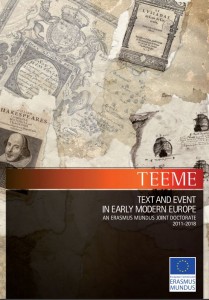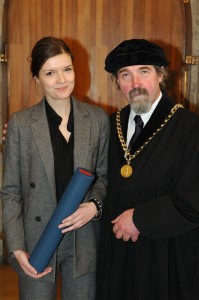The programme ERASMUS MUNDUS Joint Doctorate: Text and Event in Early Modern Europe (EMJD TEEME) is one of nine international doctoral programmes selected for funding by the European agency EACEA. The programme is based on unique cooperation of academics working in the humanities and representatives of the cultural sector in four member states of the EU. Since 2010, this partnership has been supporting cultural dialogue leading to reflection of values of cultural diversity and more efficient dissemination of excellent research results in the individual countries.
EMJD TEEME is realised by a consortium of 4 universities: University of Kent (UK), Charles University (Czech Republic), Freie Universität Berlin (Germany), and Universidade do Porto (Portugal). Currently, there are 31 students from 25 countries studying in the programme at various stages, and 5 students have earned their degrees already. In 2013, a very successful TEEME annual conference was organised in Prague, with the participation of the renowned historian Carlo Ginsburg. Currently, it is not possible to apply for the EMJD TEEME, for Erasmus Mundus Joint Doctorates have been cancelled in the Erasmus+ scheme, but there are new joint doctoral programmes in the scheme Horizon 2020.
 The main research aim of EMJD TEEME is research of history and its influence on the present. It focuses on Europe and its relation to the world in the Early modern period (app. 1400–1700), understood as the age which formed the basis for the current organisation of the world, the political turning points and economic dependencies. The academics and the students explore important relations of global processes and events to current cultural and political phenomena, and concentrate on the lasting impact of Early modern texts and events on contemporary globalised world.
The main research aim of EMJD TEEME is research of history and its influence on the present. It focuses on Europe and its relation to the world in the Early modern period (app. 1400–1700), understood as the age which formed the basis for the current organisation of the world, the political turning points and economic dependencies. The academics and the students explore important relations of global processes and events to current cultural and political phenomena, and concentrate on the lasting impact of Early modern texts and events on contemporary globalised world.
The main social aim of EMJD TEEME is to prepare a new generation of leading researchers, managers of cultural institutions, and experts on cultural politics who will be able to respond to the requirements and challenges of the present in a creative manner, as forgetting history and loss of cultural awareness shall threaten political and cultural integration of the globalised world more and more in the 21st century. By working in international research teams, the students gain knowledge and experience necessary for successful participation in contemporary discussions about global risks which the current cultures and states have to face. Thanks to its basic focus on mutual relations between the past and the present, EMJD TEEME increases the historical awareness and the sense of cultural belonging in Europe.
By its structure and content, EMJD TEEME has defined a new standard for international PhD programmes in the 21st century. The transdisciplinary approach, going beyond traditional historical and literary methods and applying new methodologies, allows the students to overcome national, linguistic, and subject divisions, and by the requirement of comparatively oriented research in several languages, it transcends the approaches based on a narrow national focus. So far, no other doctoral programme in the world has not been conceived in a similar international, interdisciplinary, and multilingual framework.
Another important aspect of the programme is the complex and efficient system of student and staff mobility, based on annual conferences, supervision by two academics from different universities, presentation of the main themes of the project in lectures by experts from the universities taking part in the consortium, and internships in cultural institutions in the countries of the consortium. The programme also places great emphasis on team work.
 The TEEME programme at Charles University has its first graduate, Martina Pranić (originally from Croatia), who received her degree in March 2016. We have asked her about her experience with the programme.
The TEEME programme at Charles University has its first graduate, Martina Pranić (originally from Croatia), who received her degree in March 2016. We have asked her about her experience with the programme.
How would you describe your life story so far?
In my native city of Zagreb, I studied English and Comparative Literature at the Faculty of the Humanities and Social Sciences. Later, I moved to Berlin and then to Prague, where I continued my studies in the doctoral programme Erasmus Mundus – Text and Event in Early Modern Europe. I received my PhD in the subject of Renaissance literature for a dissertation entitled „Early Modern Players of Folly“. At present, I teach comparative Renaissance literature as a guest lecturer at the Department of Anglophone Literatures and Cultures CUFA.
You are the first graduate of the TEEME programme at Charles University. How did you learn about the programme and why did you choose it?
I have always been interested in Erasmus programmes, as they have the potential to acquaint the students with different intellectual environments and support mobility. My main interest is Renaissance literature (I studied Shakespeare for a long time), but I am also interested in smaller works of Czech and Croatian modern literature, so I chose Erasmus Mundus focused on Early modern studies.
What have you gained from the programme?
The main benefit of a PhD in the Erasmus programme for me was the opportunity to take part in intellectual life of two European universities. Cooperation with my supervisors – Professor Manfred Pfister (Freie Universität Berlin) and Professor Martin Procházka (Charles University) – was a great experience and their guidance was invaluable. I have also experienced life in two great cities, and I want to return to them for the rest of my life.
What would be your recommendation for the next generations of students?
I heartily recommend the Erasmus programmes (especially the new format Erasmus+) to all students who want to be exposed to a plurality of influences and ideas on their academic journey. They will gain new perspectives which will then be reflected in their own work, they will discover new dimensions and complexities. A number of my students came to Prague thanks to Erasmus programmes. They not only enjoyed the benefits of the mobility programme, but their intellectual potential will surely enrich the local academic community.
More information: Erasmus Mundus Joint Doctorate Courses








